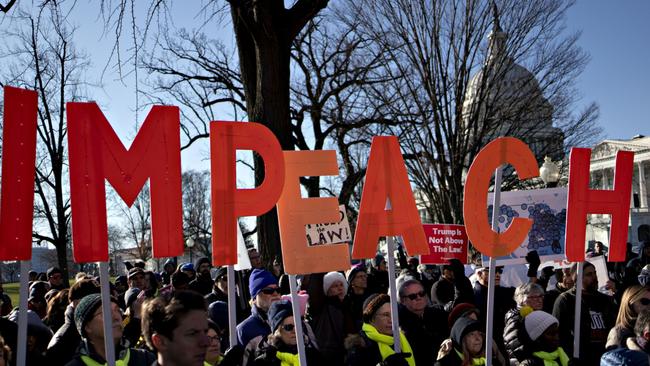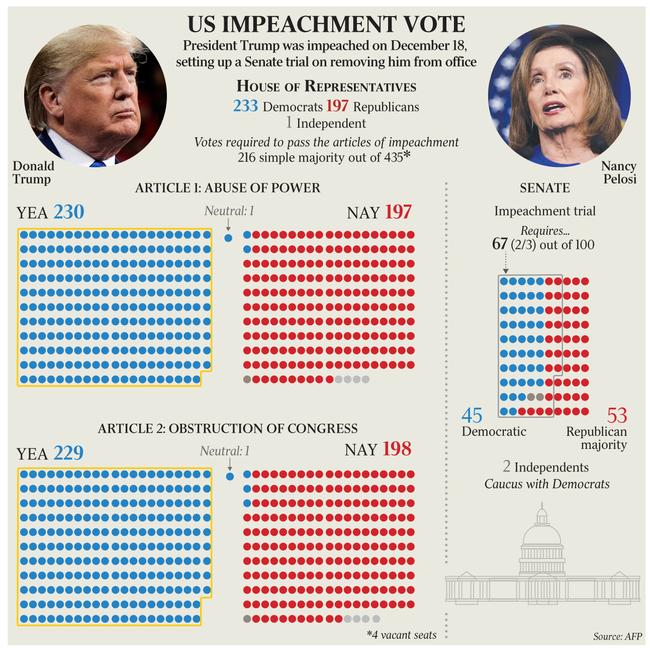The witness wildcard in Donald Trump’s Senate impeachment trial
The Democrats know the only hope of avoiding an acquittal is to shake up proceedings by calling new witnesses to testify against the President.

In a moment of made-for-television political theatre, this week a group of Democrats will take the short walk from the US House of Representatives to the Senate chamber, carrying the articles of impeachment against Donald Trump.
On the Senate floor they will read out those articles, clearing the way for only the third Senate trial of an impeached president.
Twenty-one years ago this month, a similar Senate trial against Bill Clinton held the nation in thrall for almost five weeks.
This time the anticipation seems less palpable in Washington, with much of the US media giving more prominent coverage to the confrontation with Iran and even the Democratic presidential primary race.
No one knows how many weeks Trump’s impeachment trial will last because many of the key decisions about the trial, especially whether to call new witnesses, have yet to be determined.
But there is every chance that the trial may still be under way on February 3, when Democrats hold their first presidential caucus in Iowa, and on February 4, when Trump delivers his State of the Union address.
Trial tribulations
Since Democratic house Speaker Nancy Pelosi decided last month to delay the transmission of the articles of impeachment to the Senate, both Republicans and Democrats have battled to shape the nature of a Senate trial to their advantage.
Pelosi delayed the sending of the articles, which is required before the Senate can hold a trial, in the hope of forcing Senate Republicans to agree to Democrats’ demands that new witnesses be allowed.
Republican Senate leader Mitch McConnell has stood firm, refusing to allow Pelosi to influence the way the Republican-controlled Senate conducts the trial.
“We will not cede our authority to try this impeachment. The house’s turn is over,” he said, referring to the December 18 vote by the Democrat-controlled house to impeach the President.
McConnell says he wants to conduct the trial using a similar, but not identical, format to that used for Clinton’s Senate impeachment trial in 1999.
This would mean that after Chief Justice John Roberts was sworn in to preside over the trial, the house Democratic impeachment managers — who act as prosecutors — and Trump’s team of lawyers would give opening statements. Senators would be able to present written questions to both sides and at some stage after that the Senate would vote on whether to call witnesses.
Pelosi says the house will vote to transmit the articles of impeachment on Thursday (AEDT) and to name the so-called impeachment managers who will prosecute the case against Trump. The small team of Democratic impeachment managers is expected to be led by house intelligence committee chairman Adam Schiff and house judiciary committee chairman Jerry Nadler.
The President’s team is expected to be led by White House counsel Pat Cipollone and Trump lawyer Jay Sekulow.
McConnell says the delivery of the articles of impeachment this week will allow the Senate trial to begin in earnest next Wednesday, when the Senate will consider the rules package to govern the trial.

Dismiss or acquit
Trump has indicated in recent days that he thinks the Senate should vote to dismiss the impeachment case outright and therefore not hold a trial at all.
“Many believe that by the Senate giving credence to a trial based on the no evidence, no crime, read the transcripts, ‘no pressure’ Impeachment Hoax, rather than an outright dismissal, it gives the partisan Democrat Witch Hunt credibility that it otherwise does not have,” Trump tweeted this week.
“I agree,” says White House press secretary Stephanie Grisham. “The President shouldn’t have to go through this, he did nothing wrong.”
But many Senate Republicans oppose a dismissal, making it unlikely such a motion would pass the Senate, where Republicans hold a majority of 53 seats to 47.
“The outcome will not be a dismissal, it will be an acquittal,” Republican senator Ted Cruz says. “That is a much better outcome for the President, to be acquitted of these charges.”
The Senate will try Trump on charges of abuse of power in allegedly pressuring Ukraine to investigate his political rival Joe Biden and Biden’s son Hunter, and also obstruction of congress for seeking to block witnesses and documents during the house impeachment inquiry.
Trump is railing against the whole process, labelling it a partisan witch-hunt and a hoax, and maintaining he did nothing wrong in his dealings with Ukraine.
Pelosi says the Senate must conduct a fair trial and must end what she called the “cover up”.
“In the Clinton impeachment process, 66 witnesses were allowed to testify including 3 in the Senate trial, and 90,000 pages of documents were turned over,” Pelosi tweeted. “Trump was too afraid to let any of his top aides testify & covered up every single document. The Senate must #EndTheCoverUp.”
Neither the Democrats or Republicans pretend the Senate trial will result in anything other than an easy acquittal of Trump.
To convict a president, the Senate needs a two-thirds majority or 67 votes, meaning that at least 20 Republicans would need to vote to convict the President, with zero defections from Democratic ranks.
So far only three Republican senators, all moderates — Susan Collins from Maine, Lisa Murkowski from Alaska and Mitt Romney from Utah — are seen as possibilities to cross the floor and vote against the President.
On the Democratic side, two senators from conservative states, Doug Jones in Alabama and Joe Manchin in West Virginia, could potentially vote with Republicans against impeachment.
Shake it up
The Democrats know that the only hope of shaking up this predictable conclusion is to throw a wildcard into the proceedings by calling new witnesses to testify against the President.
They want to subpoena former national security adviser John Bolton and acting White House chief of staff Mick Mulvaney to testify, among others. Neither one testified in the house impeachment inquiry but Bolton — who is known to have opposed the White House’s actions on Ukraine — says he is willing to testify if subpoenaed.
Democrats see Bolton as their best chance of securing damaging testimony against the President, but the White House has warned that it will exert executive privilege if necessary to protect the disclosure of conversations between Bolton and Trump over Ukraine.
McConnell is pushing back against the idea of witnesses, warning the President that Republicans have the numbers to acquit him and that new witnesses could potentially help the Democrats.
McConnell says the Democrats have already prosecuted their case against Trump in the house and there is no need for the Senate to go “fishing” for more evidence.
“If the existing case is strong, there’s no need for the judge and the jury to reopen the investigation,’’ McConnell says.
“If the existing case is weak, house Democrats should not have impeached.”
Trump initially wanted to call witnesses, including Joe and Hunter Biden, as well as the anonymous intelligence whistleblower whose complaint triggered impeachment proceedings, but he has since agreed with McConnell. Democrats say it would be unprecedented not to call witnesses in a Senate impeachment trial.
In the Clinton trial, the Senate obtained trial depositions from three witnesses — Monica Lewinsky, Clinton confidant Vernon Jordan and White House aide Sidney Blumenthal. In the Senate impeachment trial for Andrew Johnson, in 1868, 41 witnesses appeared.
Democrats believe they have Republicans in a difficult position on the issue of witnesses because they can portray any attempt to block witnesses as a cover-up. Senate minority leader Chuck Schumer says any attempt to ban new witnesses and evidence would make the trial “illegitimate and a sham”.
“Pursuing witnesses and documents makes us better off, no matter the outcome,” he says.
During the Clinton impeachment trial, Schumer argued against witnesses while McConnell argued for them.
Partisan politics
But Democrats may be able to force new witnesses to appear. When the Senate votes on the issue the Democrats will only need a simple majority, or four Republicans, to pass the motion to call new witnesses. Moderate senators Collins, Romney and Murkowski have indicated they would likely vote to call witnesses.
“I’ve said I’d like to hear from John Bolton,” says Romney. “I expect that, barring some kind of surprise, I’ll be voting in favour of hearing from witnesses after those opening arguments.”
Several other Republicans are also considering voting for witnesses.
Republican Lamar Alexander, who is retiring at the end of the year, says he may vote to hear witnesses “if I needed to. Or I might not. Or I might.”
But Republicans warn that if the Democrats succeed in calling witnesses, then Republicans will call their own witnesses who the Democrats do not want on the stand. McConnell says if witnesses are called then Republicans would “want the whistleblower; we’re going to want Hunter Biden” or Joe Biden.
Presidential impeachment trials are held so rarely that there are few hard and fast rules or processes governing them.
In theory, senators are meant to behave like jurors in a trial, weighing up the evidence in an impartial manner, but in this era of hyperpartisan politics, this won’t happen.
McConnell says he would be in “total co-ordination with the White House counsel” and that “there will be no difference between the President’s position and our position as to how to handle this, to the extent that we can”.
His comments were criticised by Democrats, even though Democrats have been no less partisan than Republicans during the whole impeachment process.
“These Republicans are not the Republicans of old,” says Schumer. “They are totally supine in their obeisance to Trump.”
This Senate impeachment trial is historic but it remains to be seen how closely Americans follow it.
Winning hand
The spectacle of the house impeachment inquiry failed to move public opinion one way or the other, with a slight majority of 49 per cent supporting impeachment — a number that has remained steady since October last year.
Trump maintains that impeachment has only galvanised his support base and polls have the President enjoying approval ratings of more than 90 per cent among Republicans.
Political donations to his campaign in the last three months of 2019 — at the height of the impeachment saga — jumped to $US46m ($66.6m), his best haul of the year.
Australia’s outgoing ambassador to the US, Joe Hockey, says he believes that when the dust settles it will be Trump who may benefit more politically from this impeachment trial.
“The biggest impact of impeachment is likely to be the firing up of Donald Trump’s base,” he says.
Cameron Stewart is also US contributor for Sky News Australia.


To join the conversation, please log in. Don't have an account? Register
Join the conversation, you are commenting as Logout